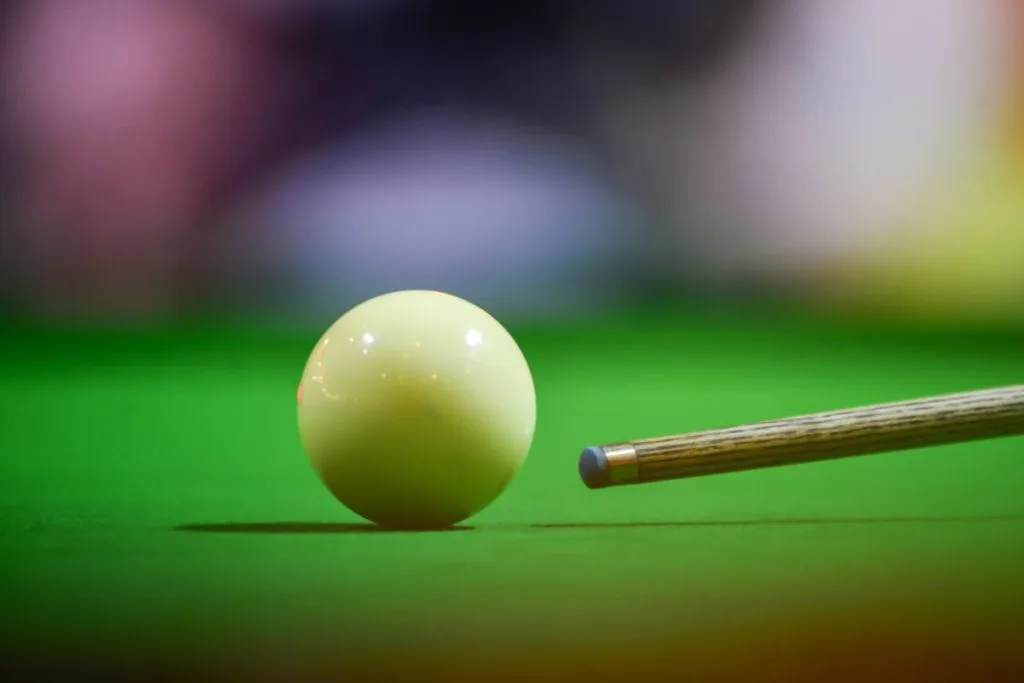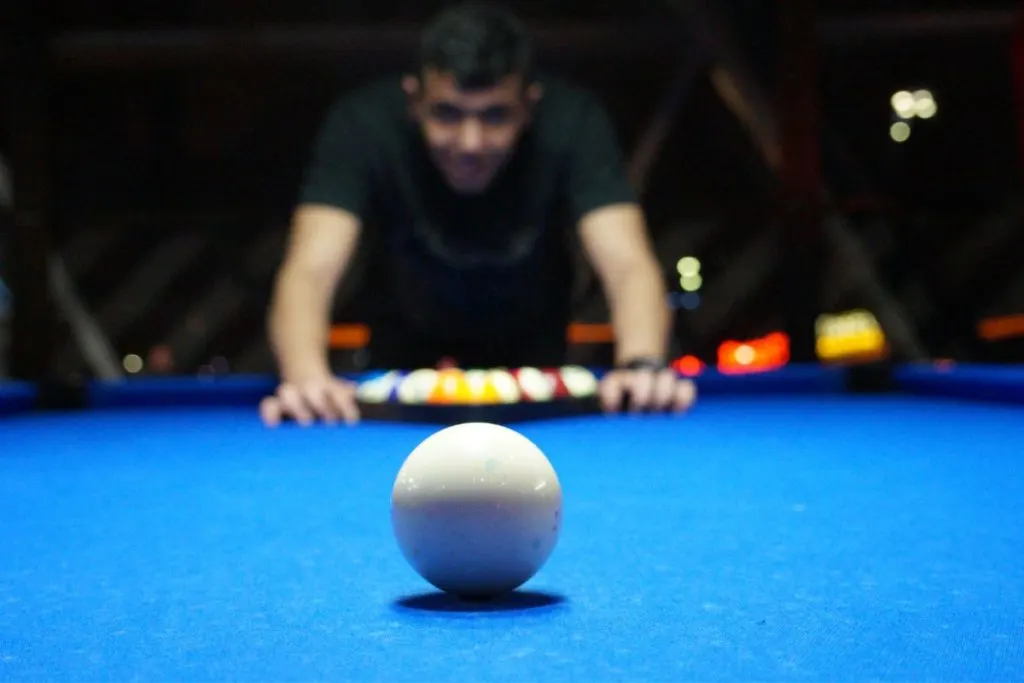*This post may contain affiliate links. As an Amazon Associate we earn from qualifying purchases.
Are you here because you’re trying to compare billiards vs pool? Let me guess: you’ve heard the terms thrown around before, maybe even played a game or two, but you’re still not entirely sure what sets these two games apart?
Fear not, my friends. That’s why I’m here. I’m going to break it down for you in a way that even the most clueless among us (cough, me, cough) can understand.
But before we dive into the nitty-gritty, let’s start with the basics.
Although some people use the term billiards to describe what’s more commonly known as pool, that actually isn’t exactly correct.
Billiards and pool are both cue sports played on a table with balls and a cue stick. But, as you’ll soon discover, that’s pretty much where the similarities end. The key difference between the two games is the size of the table and the number of pockets.
Billiard balls are also a different color than pool balls (which can help you differentiate between the game tables a bit more easily).
Billiards is played on a larger table with no pockets, whereas pool is played on a smaller table with six pockets.
Now, you might be thinking, “Oh, that’s it? That’s the big difference? I could have figured that out on my own.” But, trust me, there’s more to it than that. Each game has its own set of rules, strategies, and equipment as well.
So although you can say billiards to refer to games played on similar-looking tables with a cue and balls if you want to be exactly precise you should call pool pool and billiards billiards. Another way to differentiate exactly what you are talking about is to only call it carom billiards instead of just billiards.
In this guide, we’ll take a deep dive into the history of both games, the different types of billiards and pool, equipment, strategy, and the competitive scene. We’ll also take a look at the popularity of billiards and pool tables.
By the time you’re finished reading, you’ll be an expert on both games and able to impress your friends at your next game night.

History of Billiards
Let’s start with the granddaddy of them all: billiards.
The origins of billiards can be traced all the way back to the 15th century, where it was played by royalty and nobility on large tables using the butts of their halberds (look it up, it’s a real thing) as cues and their armor as balls.
Talk about making do with what you’ve got!
As time went on, the game evolved and began to resemble the billiards we know and love today. The cues and balls became more specialized, and new games were invented, like carom billiards and snooker.
Throughout the centuries, many famous players have contributed to the game and its evolution, including “The Professor” Ralph Greenleaf and “The Kid” Minnesota Fats.

History of Pool
Now, let’s move on to the younger, cooler cousin of billiards: pool.
The origins of pool can be traced back to the late 19th century, where it was mainly played by the working class in bars and taverns. It was a more accessible version of billiards, as it required less space and less expensive equipment (since the pool tables would be provided at the bar or tavern).
All you need is a pool cue, pool tables, and the balls, and you are ready to go so the budget to play at a bar is pretty low since they provide all three of those things. And even if you get a custom cue stick you won’t have to spend a fortune on it either.
As pool grew in popularity, new games were invented, such as 8-ball and 9-ball, and it quickly became a staple in bars and taverns across America.
In terms of the competitive scene, there is a difference between American and British pool. American pool typically refers to games played on larger tables with pockets that are cut into the corners and sides, whereas British pool typically refers to games played on smaller tables with pockets that are cut into the cushions.
But let’s not get ahead of ourselves, we’ll dive deeper into these differences later on.
As of now, pool is more popular than both billiards and snooker (a variation of pocket billiards) and is even a popular sport that can be seen on TV (and in many a game room).

Equipment (Pool Cue Vs Billiard Cue)
Now, let’s talk equipment. And, no, I don’t mean the fancy neon lights and loud music that you’re used to seeing in pool halls. I mean the actual physical objects you’ll be using to play the game.
First up, billiards. The tables for billiards are typically larger, usually around 9-10 feet long, and have no pockets. However, if you are playing billiards on a snooker table those will have pockets.
The cues are also longer and thinner, to accommodate the larger table.
And the balls, well they’re the same size as pool balls but they tend to be made of different materials like phenolic resin.
Next up, pool. The tables for pool are typically smaller, around 7-8 feet long, and have pockets (usually 6). The cues are shorter and thicker, to match the size of the table. And, as mentioned before, the balls are standard size.

Pool Vs Billiards Gameplay
Now that we’ve covered the equipment, let’s talk gameplay.
First, let’s start with billiards. The rules of billiards can vary depending on the game you’re playing (snooker, carom, etc.). But, generally speaking, the object is to use the cue ball to hit other object balls and sink them into the pockets or to simply hit them into each other (in the event of playing carom billiards).
Points are awarded based on the type and number of balls sunk or hit into each other and a cushion.
As for pool, the rules are a bit simpler. The goal is to sink all of your specific designated balls (stripes or solids) and then sink the 8-ball to win the game (assuming that you are playing 8-ball).
Pool Vs Billiards Strategy
So, you’ve got your equipment, you know the rules, now what? It’s time to talk strategy in pool vs billiards.
First, let’s talk billiards. The strategy for billiards can be quite advanced and it’s often considered a game of finesse.
One tip for improving your game is to practice proper cue alignment and stroke. Another tip is to study advanced techniques such as “english” and “draw” shots.
As for pool, the strategy is a bit more straightforward. You’ll want to focus on proper aim and stroke, as well as learning how to control the cue ball. It’s also important to study the different types of pool games and their unique rules and strategies.
There are many different pool games that you can play but the most common (and popular) one is 8-ball. So if you are new to playing pool learning how to play and different strategies for playing 8-ball pool is a good place to start.
Competitive Scene
Now, let’s talk about the big leagues. The competitive scene for billiards and pool is quite different.
First, billiards. The major tournaments for billiards include the World Snooker Championship and the World Pool-Billiard Association. The professional billiards scene is well-established, with well-known players and a dedicated fan base.
On the other hand, pool is a bit more underground. The major tournaments include the World Pool Masters and the U.S. Open 9-Ball Championship. While it doesn’t have the same level of recognition as billiards, the pool scene is still active and competitive.
Casual Play
So, you’re not interested in becoming the next “Minnesota Fats” or “Efren Reyes”? That’s okay, casual play is still a lot of fun.
Billiards, as mentioned earlier, has been traditionally popular among the higher class, but in recent years it’s becoming more popular in casual settings as well, like bars and taverns.
Although, the rules and strategy are a bit different in casual play as compared to competitive play.
As for pool, it’s always been a staple in casual settings, like bars and taverns. It’s a great way to pass the time and enjoy a few beers with friends. However, in casual pool play, it’s not always about winning, it’s about having fun and making new friends.
Is Carom Billiards Played On Pool Tables? (What Game Tables Are Used?)
Yes, you can play billiards on pool tables, but it’s not the ideal setup. The main difference between billiards and pool is the size of the table and the absence of pockets.
Billiard tables are typically longer than pool tables, which can make it difficult to play on a pool table. The longer table allows for more room to maneuver and make shots, while the shorter pool table can feel cramped and restrictive.
Another difference between the two games is the composition of the table. Billiard tables have a smooth surface, while pool tables have felt or cloth on top. This can affect the way the balls roll and can make it more challenging to play billiards on a pool table.
The smooth surface of a billiard table allows for more precise shots and better control over the ball, while the felt on a pool table can create more friction and make it harder to control the ball.
While it’s possible to play billiards on a pool table, it’s not the best option. The longer table and smooth surface of a billiard table are better suited for the game. If you’re serious about playing billiards, it’s best to invest in a billiard table specifically designed for the game.
But if you’re just looking for a casual game, you can definitely play billiards on a pool table. Just keep in mind that it might not be as smooth and precise as playing on a billiard table.
Final Thoughts
And there you have it, folks. A comprehensive guide to the difference between billiards and pool. By now, you should have a good understanding of the history, equipment, gameplay, strategy, and competitive scene for both games.
So, which game should you try? That’s up to you. If you’re looking for a more refined and elegant game, with a touch of class, then billiards might be for you. But if you’re looking for a more laid-back and casual game, then pool is the way to go.
Both games can be cheap or expensive to play depending on whether you purchase the pool table and a collection of cue sticks or just have a cue that you carry with you when you go to play at a pool hall or bar.
You don’t have to buy a lot of products to be able to participate in these games but they can help you to become a better player.
In any case, whether you’re a serious player or just looking for a fun way to pass the time at the bar down the street, billiards and pool are both great games that offer hours of entertainment. And who knows, you might even become the next “Minnesota Fats” or “Efren Reyes”!
I hope that this information has been helpful to you!
What’s the difference between billiards and pool?
The main difference between billiards and pool is the size of the table and the number of pockets. Carom billiards is played on a larger table with no pockets, whereas pool is played on a smaller table with six pockets.
What is the difference between American and British pool
American pool typically refers to games played on larger tables with pockets that are cut into the corners and sides, whereas British pool typically refers to games played on smaller tables with pockets that are cut into the cushions.
